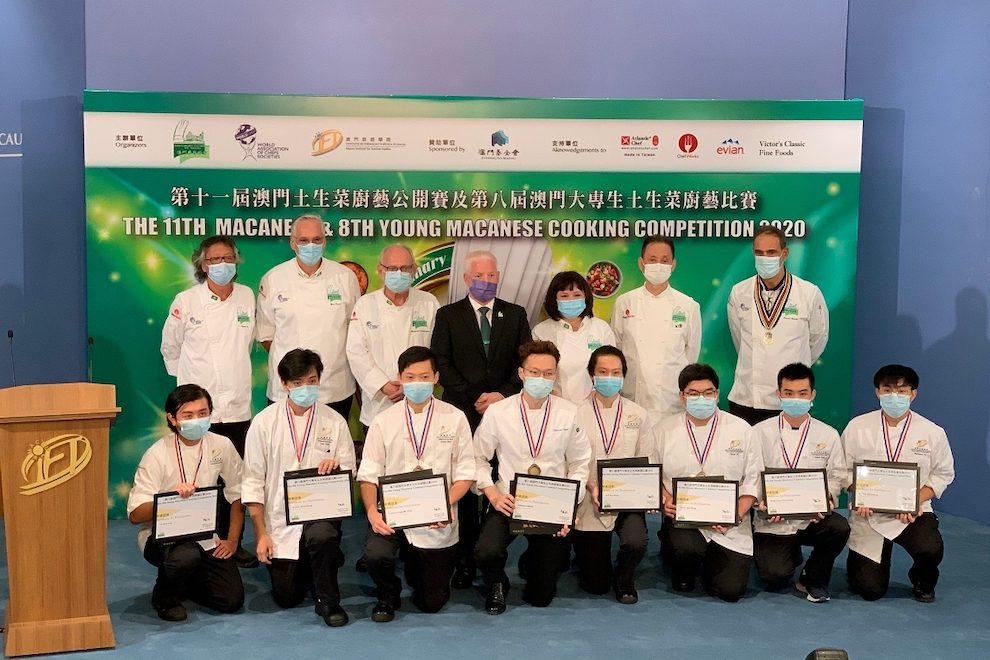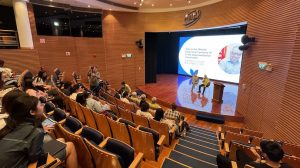IFTM and the Macau Culinary Association recently co-organised 2 cooking competitions focused on Macanese cuisine, a fusion of Chinese cooking and recipes from lusophone places. The 11th Macanese Cooking Competition and the 8th Young Macanese Cooking Competition were held at the IFTM Mong-Há Campus on 27 November.
This year’s events were marked by a special moment: a guest appearance from centenarian Mrs. Aida de Jesus, considered one of the leading exponents and custodians of Macanese cuisine. Prior to the announcement of the results of the cooking competitions, Mrs. de Jesus was presented with an ‘Outstanding lifetime achievement to Macanese cuisine’ award by the President of the Macau Culinary Association, Mr. Matthew Helm.
Since their respective inception, the purpose of the Macanese Cooking Competition and the Young Macanese Cooking Competition has been to promote Macanese cuisine to the general public and ensure the transfer to a new generation of this unique cultural tradition, as well as enhancing exchanges between Macao tertiary education students and professional chefs.
The Macanese Cooking Competition is an annual competition for industry professionals. It aims to promote Macanese cuisine among local chefs.
The Young Macanese Cooking Competition is targeted at higher education students. It aims to offer participants an opportunity to learn more about the culture and history of Macanese cuisine.
Macanese cooking contests are part of IFTM’s efforts to assist in increasing consumer and hospitality industry awareness of this gastronomic tradition. The Institute has met that objective also by offering Macanese cuisine training courses and by hosting cooking demonstrations.
Chef Wong Meng Kang, from Macao integrated resort Wynn Macau, won the senior competition, making stuffed crab meat for the appetiser, a main course featuring tamarind and shrimp paste flavourings, and almond and coconut cake for dessert.
Chef Wong is actually from Malaysia. He says: “My chef [boss] wanted me to try something new, something I had never tried before, so it was more of a challenge.”
Regarding whether Macanese food could find fresh popularity in other places, such as Malaysia, Chef Wong states: “Of course. Many ingredients used in Macanese cooking are similar to Malaysia. So, I think Malaysians would accept Macanese cooking.”
First prize in this year’s Young Macanese Cooking Competition went to Tony Chen Jing Tong, a Year 2 student in the Culinary Arts Management Bachelor Degree Programme at IFTM. “I am very happy to have won, and a bit surprised,” he says.
One of his dishes featured Chinese salty fish – rather than bacalhau, Portuguese salted cod – in order to create a fresh “fusion” dish, he says.
The Macau Culinary Association’s Mr. Helm says of Tony’s winning work: “He did something very different to all the rest of the participants.”
He adds there had been a “2-hour discussion” among the judges, with “2 neutral chefs brought in,” to help decide how to assess the work. Tony had “maintained the flavour profile” of Macanese cuisine, “which everyone agreed on,” says Mr. Helm.
IFTM “is very important” in maintaining the tradition of Macanese food, Mr. Helm points out, “because they actually have a curriculum for Macanese cuisine, hence why we work with IFTM to have these competitions.”









